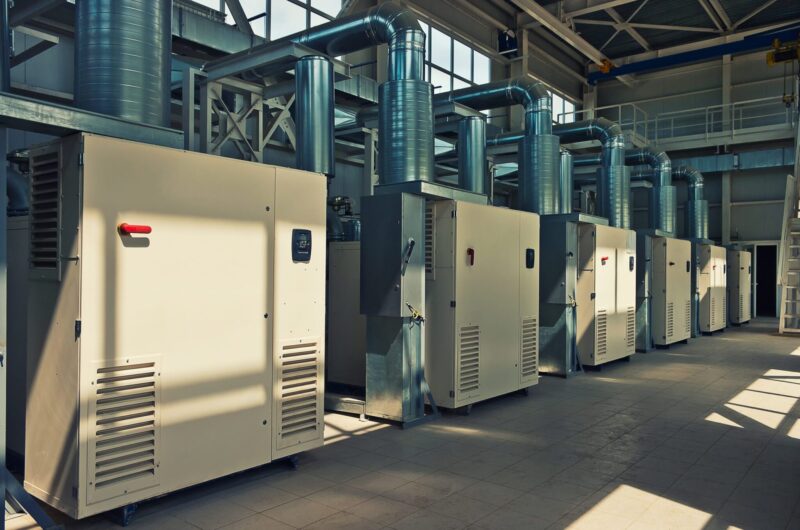An air compressor is a vital piece of equipment in many industries, providing power for pneumatic tools, machinery, and various applications. Just like any other mechanical device, regular maintenance is crucial to keep your air compressor running at its best and ensure optimal performance.
Why Regular Maintenance is Vital for Your Air Compressor
Regular maintenance is essential for your air compressor to ensure its longevity, reliability, and efficiency. By performing routine maintenance tasks, you can prevent costly breakdowns, minimize downtime, and extend the lifespan of your equipment.
One of the primary reasons for regular maintenance is to maintain proper lubrication. Lubricating your air compressor regularly helps reduce friction and wear on the moving parts, preventing premature failure. It also helps in ensuring smooth operations and reduces the risk of overheating.
Cleaning is another crucial aspect of air compressor maintenance. Over time, dirt, dust, and other contaminants can accumulate in your compressor, clogging filters and reducing airflow. Regular cleaning helps prevent such buildup and ensures the proper functioning of the compressor.
The Common Signs that Indicate Your Air Compressor Needs Service
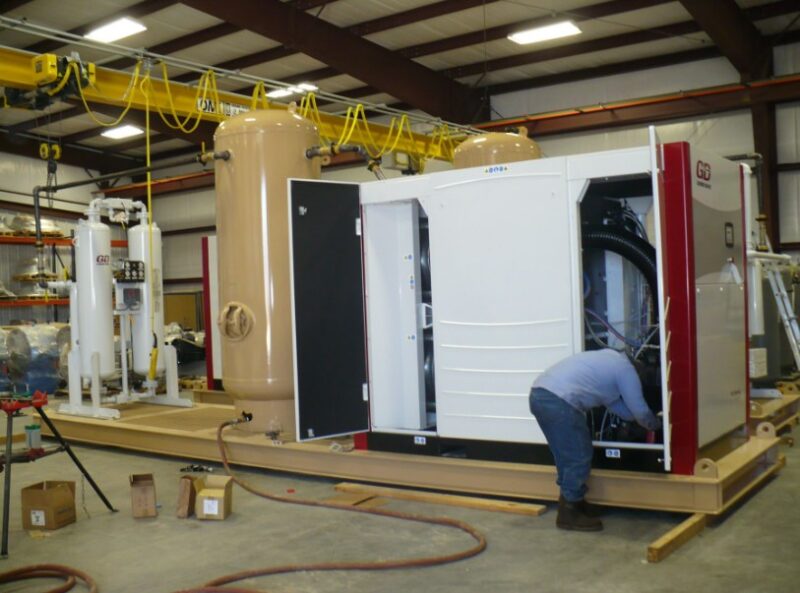
Recognizing the signs that your air compressor needs service is essential to address issues promptly and prevent major breakdowns. Here are some common signs to look out for:
- Unusual noises ─ If your air compressor is making strange noises such as grinding, rattling, or squealing, it may indicate that there is a mechanical problem.
- Poor performance ─ If you notice a decrease in the pressure or airflow from your air compressor, it may be a sign of underlying issues that require attention.
- Excessive oil consumption ─ If you find that your air compressor is consuming oil rapidly, it could indicate a leak or problem with the system.
- Increased energy consumption ─ If your air compressor is suddenly using more energy than usual, it may be a sign of inefficiency or a malfunctioning component.
These signs should not be ignored, as they can be indicative of larger issues that, if left unaddressed, can lead to costly repairs or even the need for a replacement.
How Neglecting Air Compressor Service Can Lead to Costly Repairs
Neglecting regular service and maintenance for your air compressor can have serious consequences and result in expensive repairs. When an air compressor is not properly maintained, various problems can arise, such as:
- Excessive wear on the internal components, leading to premature failure
- Buildup of contaminants, reducing efficiency and causing damage to the compressor
- Failure of critical components, such as valves or seals, resulting in a loss of pressure or complete breakdown
- Increased energy consumption and higher operating costs
By neglecting service and maintenance, you run the risk of experiencing unexpected downtime, loss of productivity, and additional expenses for emergency repairs. Investing in regular maintenance is a cost-effective way to ensure the smooth operation of your air compressor and avoid costly repairs in the long run.
Choosing the Right Air Compressor Repair Service in Texas
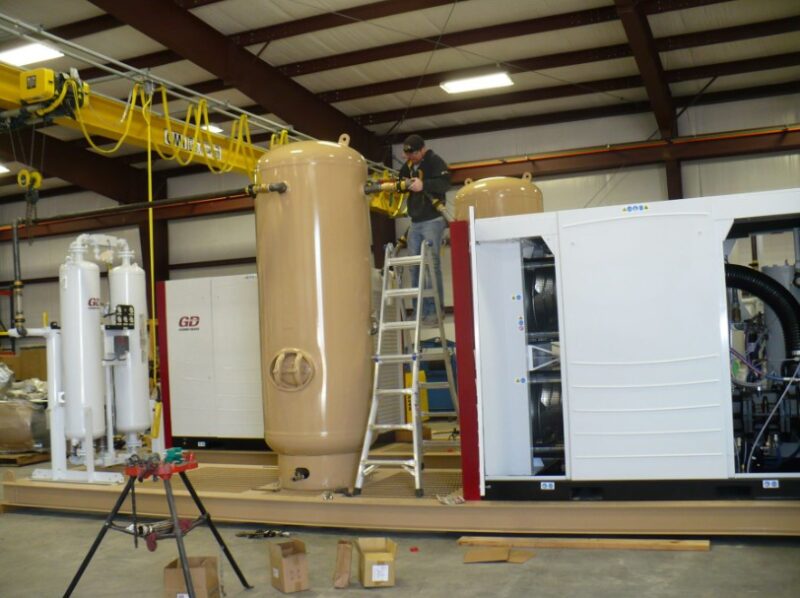
When it comes to air compressor service and repair in Texas, it’s essential to choose a professional and reliable service provider. Here are some factors to consider when selecting an air compressor repair company:
What to Look for in a Professional Air Compressor Repair Company
When searching for an air compressor repair company, ensure they have the necessary experience, expertise, and qualifications to handle your specific type and brand of air compressor. Look for certifications from reputable organizations, as they indicate a high level of technical knowledge and professionalism.
It’s also crucial to consider the reputation of the company. Read customer reviews, check their track record, and ask for referrals. A reputable company will be transparent in their communication, provide accurate estimates, and have a quick response time to your inquiries.
Understanding the Different Types of Air Compressor Repair Services Available
Air compressor repair services can vary depending on the type and severity of the issue. Some common types of air compressor repair services include:
- Compressor rebuild ─ Rebuilding a compressor involves dismantling the unit, replacing worn-out components, and restoring it to its original working condition.
- Component replacement ─ If a specific component, such as a valve or motor, fails, it may need to be replaced to restore the functionality of the compressor.
- Preventive maintenance ─ Many repair companies offer preventive maintenance programs, which include regular inspections, cleaning, lubrication, and adjustment of the compressor to prevent future issues.
- Emergency repairs ─ In the case of a breakdown or major malfunction, an air compressor repair company should be able to provide emergency repair services to minimize downtime.
Understanding the specific repair services offered by a company will help you choose the one that aligns with your needs and requirements.
Questions to Ask Before Hiring an Air Compressor Repair Technician
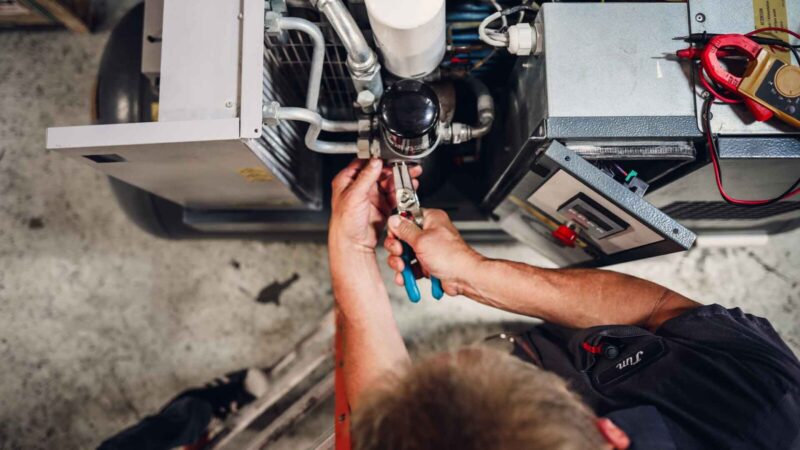
Before hiring an air compressor repair technician, here are some important questions to ask:
- Are you certified to work on my specific brand and model of air compressor?
- How many years of experience do you have in repairing air compressors?
- What is your typical response time for emergency repairs?
- Do you offer any warranty or guarantee for the repair work?
Asking these questions will help you assess the technician’s expertise, reliability, and professionalism before entrusting them with your air compressor repair.
DIY Air Compressor Maintenance Tips and Tricks
While professional maintenance is essential for your air compressor, there are some maintenance tasks you can perform yourself to keep it in good working condition. Here are some DIY air compressor maintenance tips and tricks:
Essential Tools and Supplies for Air Compressor Maintenance
Before you start performing maintenance on your air compressor, it’s essential to have the right tools and supplies. Some essential tools and supplies for air compressor maintenance include:
- Air compressor oil
- Air filter
- Water separator
- Cleaning brushes
- Wrenches
- Screwdrivers
- Pressure gauge
Having these tools and supplies readily available will make it easier for you to perform routine maintenance tasks.
Step-by-Step Guide to Cleaning and Lubricating Your Air Compressor
Cleaning and lubricating your air compressor regularly is crucial for its proper functioning. Here’s a step-by-step guide to cleaning and lubricating your air compressor:
- Disconnect the power ─ Before starting any maintenance tasks, ensure that the power supply to the air compressor is disconnected to prevent any accidents.
- Drain the tank ─ Release the pressure in the tank and drain any remaining moisture or condensation.
- Clean the exterior ─ Use a damp cloth to remove dirt, dust, and debris from the exterior of the air compressor.
- Clean the air filter ─ Remove the air filter and clean it using compressed air or soapy water. Ensure it is completely dry before reinstalling.
- Lubricate moving parts ─ Refer to the manufacturer’s instructions to locate the lubrication points and apply the appropriate lubricant. Check the oil level and top up if necessary.
- Inspect belts and hoses ─ Check for any signs of wear or damage on the belts and hoses. Replace if necessary.
Performing these maintenance tasks regularly will help keep your air compressor in optimal condition and prevent potential issues.
Troubleshooting Common Air Compressor Issues and How to Fix Them
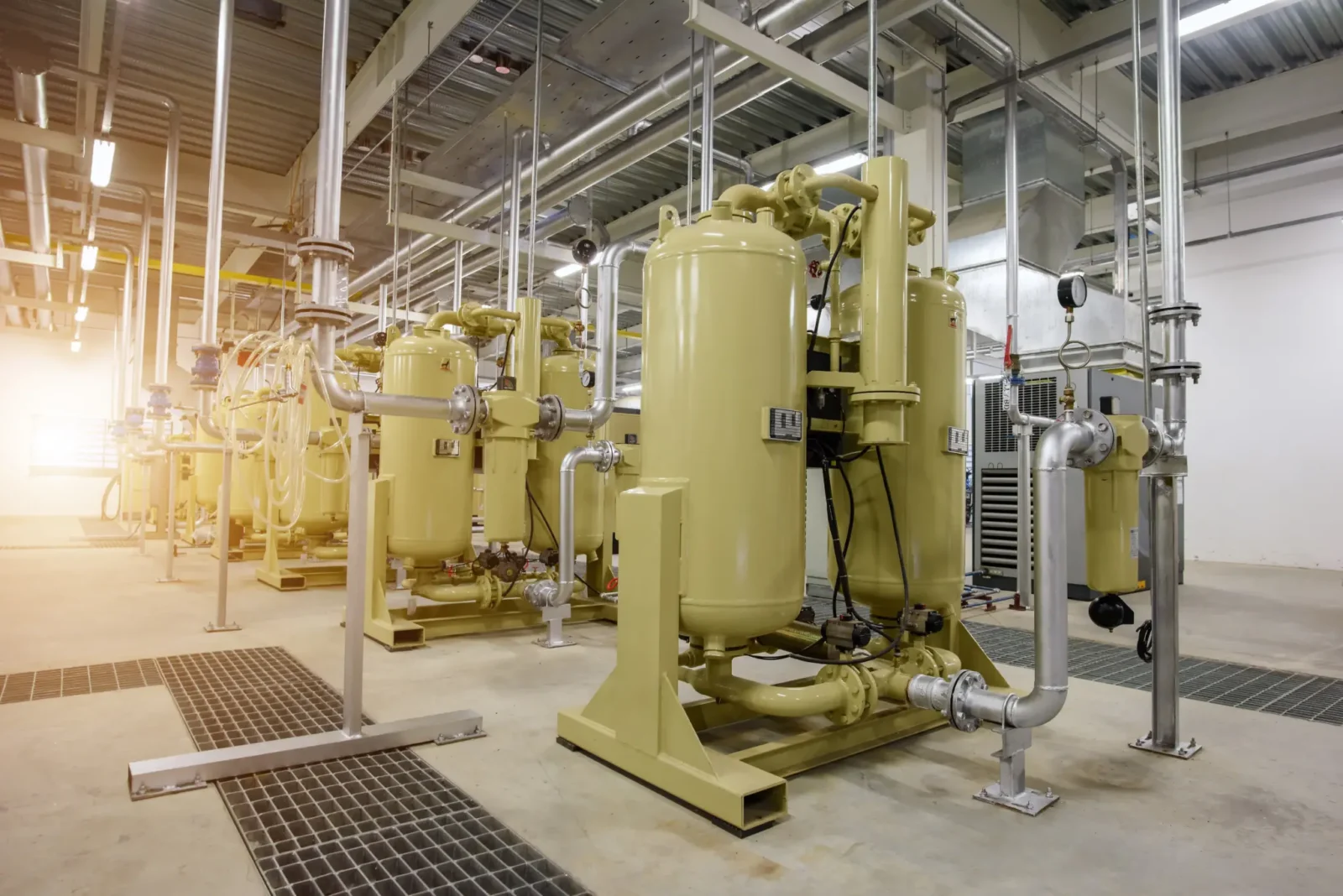
Despite regular maintenance, air compressors can still experience issues. Here are some common air compressor problems and troubleshooting steps:
- Air leaks ─ Check for any leaks in the fittings, hoses, or connections. Tighten loose fittings or replace damaged parts.
- Pressure drop ─ If you experience a drop in pressure, check the intake filter, valves, and pressure switch for any obstructions or faults.
- Overheating ─ Ensure proper ventilation around the compressor to prevent overheating. Check the cooling fan and clean any debris or dirt that may be obstructing it.
- Noise issues ─ Excessive noise can be due to loose components or worn-out parts. Tighten loose screws or replace worn-out parts as needed.
If these troubleshooting steps do not resolve the issue, it’s best to consult a professional air compressor repair technician.
Extending the Lifespan of Your Air Compressor with Proper Care
Proper care and maintenance can significantly extend the lifespan of your air compressor. Here are some best practices to ensure the longevity of your equipment:
Best Practices for Storing and Transporting Your Air Compressor
If you need to store or transport your air compressor, follow these best practices:
- Drain the tank and release pressure
- Secure all loose components and accessories
- Protect the compressor from extreme temperatures and moisture
- Use a suitable cover or case
Proper storage and transportation will help prevent damage to the air compressor and maintain its performance.
How to Optimize Air Compressor Performance and Efficiency
To optimize the performance and efficiency of your air compressor, consider the following tips:
- Keep the compressor clean and free from debris
- Ensure proper ventilation in the compressor’s surroundings
- Maintain the recommended pressure levels
- Inspect and replace worn-out components regularly
- Use the right size and type of air tools for your compressor
Following these practices will not only improve the performance of your air compressor but also reduce energy consumption and lower operating costs.
The Importance of Regularly Checking and Replacing Air Compressor Filters
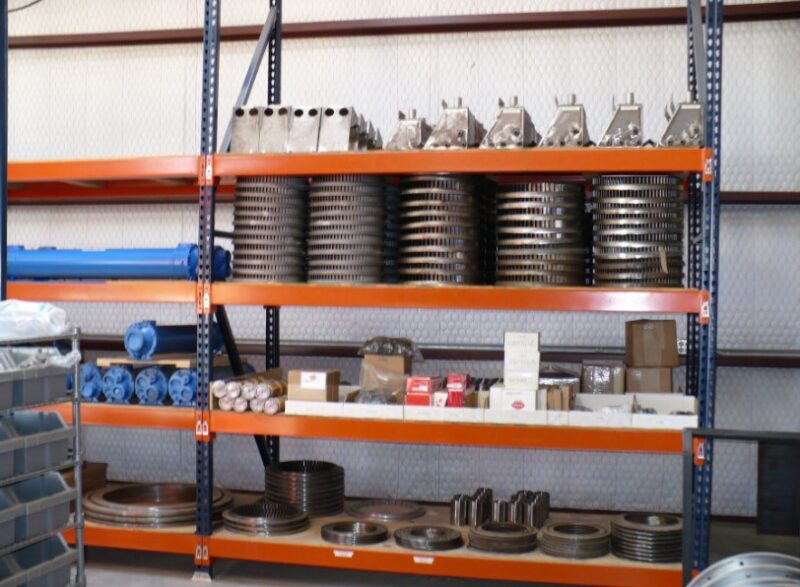
Air compressor filters play a crucial role in preventing contaminants from entering the system and affecting its performance. Regularly checking and replacing the filters is essential for optimal air quality and compressor efficiency.
There are three main types of air compressor filters:
- Intake filter ─ Prevents dust, dirt, and debris from entering the compressor
- Oil filter ─ Removes oil particles from the compressed air
- Air/oil separator ─ Separates the compressed air from the oil
Refer to the manufacturer’s guidelines on how often to inspect and replace the filters. Neglecting the filter maintenance can lead to decreased performance, increased energy consumption, and potential damage to the compressor.
By following these tips and guidelines, you can ensure the longevity and optimal performance of your air compressor, minimizing the need for repairs and maximizing its efficiency.
